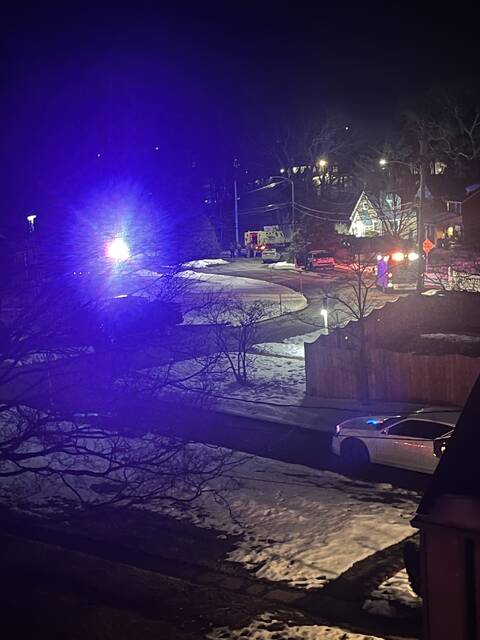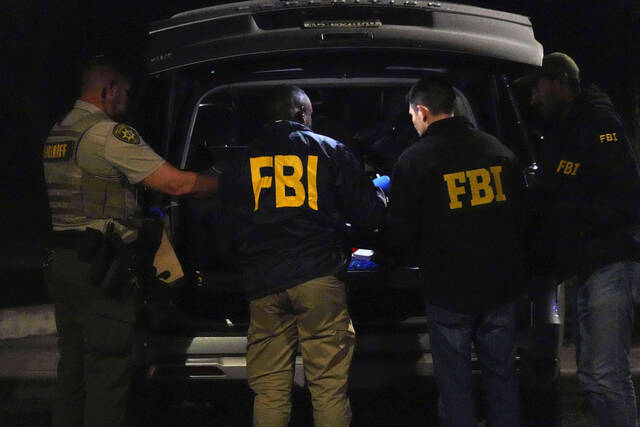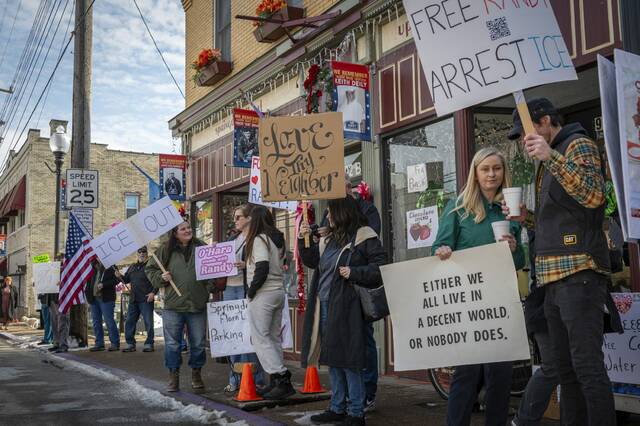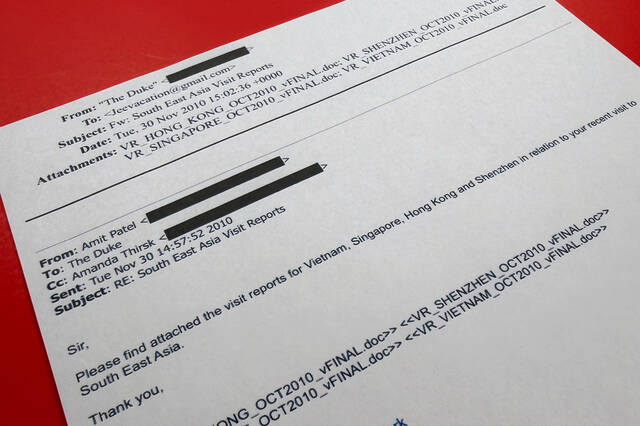The City of Pittsburgh’s so-called “jock tax” is unconstitutional, the Pennsylvania Supreme Court said Thursday.
That means that city officials, who have used it to collect millions of dollars each year from visiting performers and professional athletes, will no longer be able to do so.
In a 14-page opinion, the court said the tax, applied only to nonresidents, violates the state’s Uniformity Clause.
“Here, the city does not provide concrete reasons that would justify taxing nonresident athletes and entertainers more than resident athletes and entertainers,” Justice David Wecht wrote.
The tax, formally the Sports Facility Usage Fee, has been collected since 2005. It assesses a 3% surcharge on income from non-Pittsburgh residents while performing at the city’s publicly funded stadiums, including PPG Paints Arena, Acrisure Stadium and PNC Park.
However, in 2019, the players associations for the NHL, NFL and MLB sued in Allegheny County Common Pleas Court, alleging the tax discriminated against nonresident athletes who play here. The case has since worked its way through Pennsylvania’s appellate courts.
In oral argument before the state Supreme Court in April, the city said there is no discrimination because resident athletes who live in the city pay a 1% income tax and 2% school district tax, equaling the 3% assessed to nonresidents.
But the court, in affirming a decision from the Pennsylvania Commonwealth Court, disagreed.
Under Pennsylvania law, the city will be permitted to collect a 1% earned income tax from nonresident athletes and performers — allowing Pittsburgh officials to recoup one-third of the money being lost through the decision.
Pittsburgh Mayor Ed Gainey’s spokeswoman said the city is disappointed by the court’s ruling.
“This decision will further shift the cost burden of essential city services onto our residents, while reducing the responsibility of performers and professional athletes to contribute to covering the significant costs associated with large public events,” said Olga George.
“While we had hoped for a different outcome, we have been proactively preparing for this possibility and are working to ensure that any budgetary impacts are responsibly managed.”
It is unclear, however, if the city has prepared to pay refund claims submitted by the nonresident athletes and performers.
Stephen Kidder, an attorney representing the players’ associations, said the ruling will likely cost the city millions of dollars in refunds.
In addition, Kidder said the statute of limitations for tax claims is three years, which means that any nonresident athlete or performer who has paid the tax during that time could submit a new refund claim based on Thursday’s opinion.
“They could have dealt with this years ago,” Kidder said. “They chose to let it just play out.”
Allegheny County Controller Corey O’Connor, the Democratic candidate for Pittsburgh mayor, said the city should not have been counting on a tax that the courts were considering striking down.
“I think that was part of the conversation about transparency that we had over the last almost year at this point,” O’Connor said.
“We can’t rely on a tax that is in court. Now that’s another $4 (million) to $5 million that is lost revenue to the city. That’s why we’ve been talking about being transparent with the public about where our finances stand right now and where the projections are over the next five years. This is money that cannot be accounted for this year.”
The Gainey administration will have to craft a budget this year without the tax. But the next administration will deal with the long-term repercussions.
“That’s a huge challenge,” O’Connor said. “Any dollar that’s lost at this point could impact the city financially. Those are impacts that could affect us purchasing new equipment, investing in our parks and playgrounds.”
Tony Moreno, the Republican candidate for mayor, said he expected the tax to be struck down.
“It’s just another thing that the city has irresponsibly relied on without any backup plan,” Moreno said. “If we could just focus on what monies we do have coming in and how we could better spend them, we should be able to withstand that and go forward.”
‘Writing was on the wall’
City Controller Rachael Heisler said the tax has brought in more than $79 million and that the city expected to collect $16.8 million from 2026 to 2030.
“We have known for some time that this was a real possibility, and I have urged the administration to prepare for it in their budget projections,” Heisler said.
“The city would have been better positioned to absorb this loss had we built in a flexible buffer, as we advised in the fall of 2024.”
Councilman Anthony Coghill, D-Beechview, had criticized the Gainey administration for including revenues from the jock tax in the budget, raising concerns that the money could dry up if the court ruled against the city.
“We really should not have budgeted that in,” he said. “I knew it wasn’t going to come in our favor. The writing was on the wall.”
This year’s $666 million operating budget anticipated about $6.1 million from the facility usage fee.
“In the grand scheme of things, it’s less than one half of a percent in our revenues,” City Council Budget Director Peter McDevitt said. “It kind of equates to a rounding error. Half of a percent should not be a big deal if we were financially in a healthy position.”
But the city is required to maintain a reserve fund balance that is equal to at least 10% of its operating expenses for the entire five-year period projected in its annual budget.
The city already was projecting to fall to within less than 1% of that limit in 2029.
“It was tight before,” McDevitt said. “It’s just going to be even tighter now.”
Alternate revenue sources
Managing the lost revenue will be an issue council members and the administration will need to discuss as they prepare to adopt a 2026 budget, a process that kicks off at the end of this month.
“It may be a small percentage of the budget, but with an already shoestring budget and no room for losing any type of funding, it’s a major deal to us,” Coghill said. “It’s going to have implications. We’re going to have to find money elsewhere.”
Coghill said the city would be particularly hard-pressed to find cash if it has to reimburse athletes or performers for money it already collected.
“If that’s the case, now we’ve got big, big problems,” he said.
Councilwoman Barb Warwick, D-Greenfield, warned officials may need to discuss tax hikes.
“Obviously the decision is disappointing,” Warwick said. “I know this is something that people don’t necessarily want to hear, but I think as a city we need to really start talking seriously about the ways we can start raising revenue.”
Warwick also called upon the city’s major nonprofits to lend a financial hand.
“Yet again, it would be incredibly helpful if our large nonprofit partners would pony up funds to help us run the city that they benefit so greatly from,” Warwick said.
Warwick said it might be a good idea to keep money that is at the heart of a legal dispute or could otherwise be revoked separate from general funds so the city does not rely on it.
The jock tax money collected over the years has not been segregated in a separate account as the case wound through the courts.
“Obviously hindsight’s 20/20,” Warwick said. “It might be prudent to look into some type of an escrow scenario where we are collecting the funds but keeping them separate, so to speak, just in case rulings are not in our favor.”
Councilman Bobby Wilson, D-North Side, pointed out that officials have raised concerns about other areas of the city’s finances such as overtime spending. Other officials have pointed to declining revenues from Downtown property reassessments and increased costs as causes for concern.
“It’s just one more factor,” Wilson said. “This just deepens the concerns the public should have about finances of the city.”
Councilwoman Theresa Kail-Smith, D-West End, who did not vote for the budget last year, noted the Supreme Court’s decision comes amid federal funding cuts and as a budget impasse in Harrisburg delays the disbursement of some state funds.
“We constantly seem like we’re losing instead of gaining,” she said. “Any time there’s an issue with funding, it’s going to cause me concern.”








